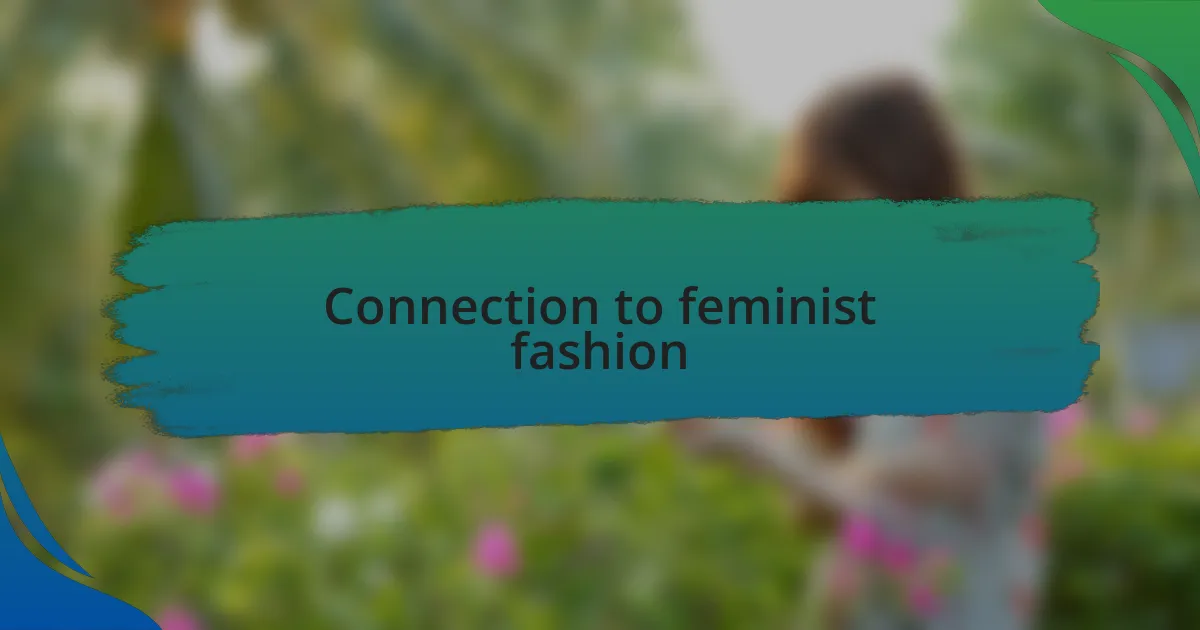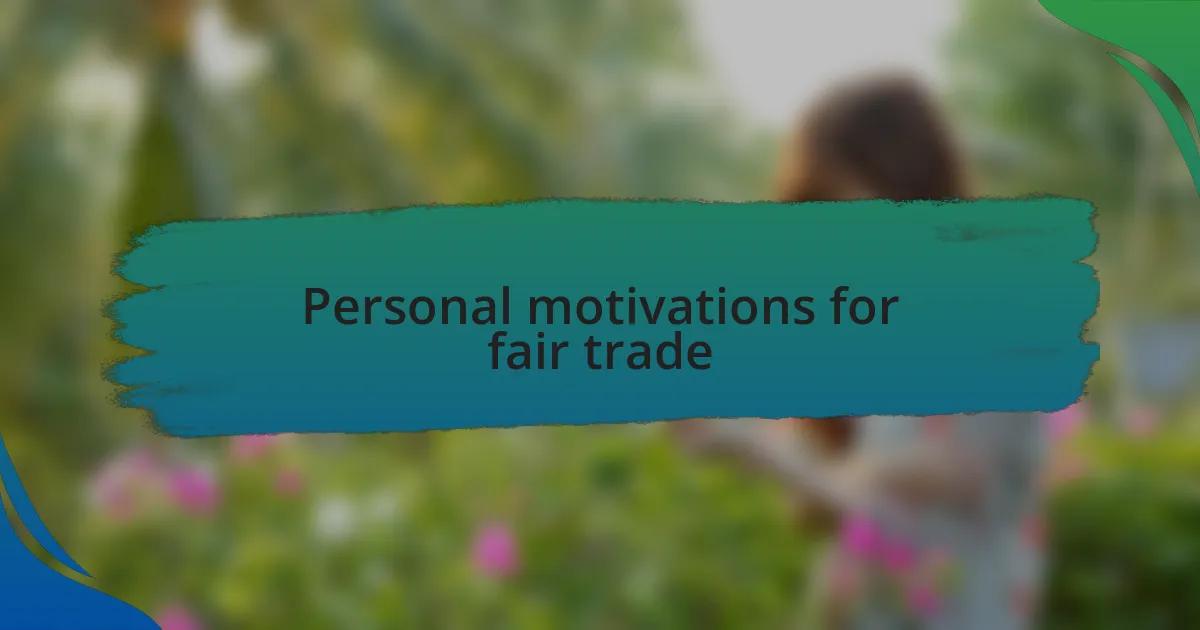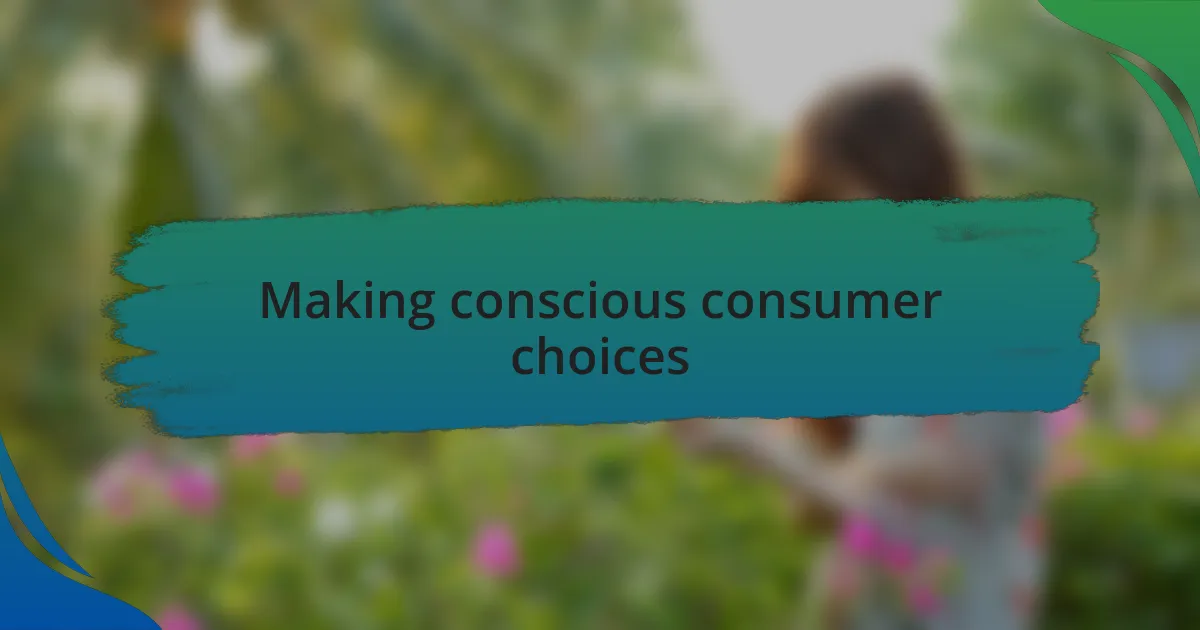Key takeaways:
- Fair trade coffee promotes ethical sourcing, ensuring farmers receive fair wages and work in safe conditions, which helps uplift communities and foster economic independence, particularly for women.
- The connection between fair trade coffee and feminist fashion highlights the importance of supporting women creators and their stories, reinforcing the impact of consumer choices on social change.
- Making conscious consumer choices, such as selecting fair trade coffee, empowers individuals to contribute to a broader movement for women’s rights and sustainable practices.
- Fair trade initiatives not only provide economic support but also foster safe spaces for women, enabling them to share experiences and invest in education and healthcare for their families.

Understanding fair trade coffee
Fair trade coffee is more than just a label; it’s a commitment to ethical sourcing and social equity. I remember the first time I sipped a cup of fair trade coffee, feeling a deep connection to the farmers behind that brew. It made me wonder: how can a simple cup of coffee hold such profound stories of struggle and resilience?
Understanding fair trade means recognizing the importance of fair wages and safe working conditions for farmers. When I learned about the challenges they face—often working in hazardous environments for minimal pay—I realized that my choices as a consumer could have a significant impact. Isn’t it remarkable how a daily habit can support sustainable livelihoods?
Moreover, fair trade coffee requires transparency throughout the supply chain, allowing consumers to know exactly where their coffee comes from. I’ve found that this transparency leads not just to better quality coffee but also fosters a sense of community between producers and consumers. Don’t you think that knowing that your morning routine contributes to someone’s well-being makes each sip even more rewarding?

Importance of fair trade
Fair trade is essential in fostering economic independence for farmers, especially women who often bear the brunt of inequitable practices in the coffee industry. I’ve met women who have transformed their lives and communities through fair trade initiatives, empowering them to invest in education and health. It’s astonishing to see how fair trade can lift entire families out of poverty, isn’t it?
Additionally, fair trade promotes sustainable farming practices that protect the environment. When I visited a fair trade coffee cooperative, I was struck by how practices like organic farming not only yield better quality beans but also preserve local ecosystems. Seeing farmers plant trees alongside coffee crops demonstrated to me the interconnectedness of our choices and the environment—each cup of coffee has the power to make a positive impact.
Moreover, the emotional bond created through fair trade experiences deepens my appreciation for the craft behind the coffee. I vividly recall chatting with a barista who shared stories of the farmers whose dedication ensures we enjoy our coffee daily. This connection adds a layer of meaning to each sip, compelling me to make thoughtfully informed choices about what I consume. Doesn’t it feel meaningful to transform enjoyment into ethical support?

Connection to feminist fashion
The connection between fair trade coffee and feminist fashion goes beyond just ethical consumption—it’s about supporting women creators. I remember attending a local market where I stumbled upon a booth selling fair trade coffee alongside handmade accessories crafted by women from coffee-growing communities. It struck me how intertwined these industries are; each piece of fashion told a story of resilience and empowerment. Doesn’t it feel rewarding to wear something that not only looks good but also uplifts women artisans?
When I think about feminist fashion, I often reflect on the battle against exploitation, a common thread with fair trade principles. By choosing fair trade coffee, I consciously support not only the farmers but also the women who are often marginalized in their communities. Each sip reminds me of the collective struggle for equity and the importance of supporting products that align with my values. Isn’t it inspiring to envision a world where our purchases lead to social change?
The narratives of fair trade coffee and feminist fashion resonate within me and create a deeper understanding of global interconnectedness. At a fair trade event, I listened to a woman discuss how her fashion line, inspired by coffee farmers, aims to amplify their stories. I felt a profound connection to her mission, demonstrating how fashion can serve as a powerful medium for advocacy. In this way, every time I enjoy that cup of coffee, I’m also championing a cause that promotes equality and recognition for women in the fashion industry.

Personal motivations for fair trade
When I first learned about the struggles faced by women coffee farmers, it struck a chord deep within me. I vividly recall meeting a coffee producer who shared stories of her journey toward empowerment and independence. Listening to her, I realized that supporting fair trade coffee was not just about the beverage itself, but about uplifting women like her who work tirelessly against the odds.
I often think about how my daily choices impact others. Opting for fair trade coffee feels like a small but significant way to stand in solidarity with these women. It makes me consider: how often do we stop to reflect on the stories behind our everyday products? Each cup becomes a moment of connection, allowing me to appreciate not just the flavor but also the profound resilience of those who cultivated it.
It’s this personal connection that fuels my passion for fair trade. I remember a conversation with a friend at a café, where we discussed how our choices can drive change in a world that often overlooks the marginalized. We pondered whether sipping fair trade coffee could spark deeper conversations about justice and equality. In those moments, I feel a blend of hope and responsibility, knowing that every purchase can contribute to a broader movement for women’s rights.

Choosing ethical coffee brands
When I stand in front of a coffee aisle, I often feel a sense of uncertainty. Which brands truly uphold ethical practices? I have learned to look for certifications like Fair Trade or Rainforest Alliance, which assure me that the farmers receive fair wages and work in safe conditions. It’s reassuring to know that my choices can support ethical farming practices, but they must be backed by transparency.
One day, I stumbled upon a brand while searching for my morning brew that stood out not just for its catchy packaging but for the community-driven stories behind it. This particular company partnered with cooperatives where women are at the forefront of the production. The emotions I felt while reading about their initiatives reminded me that it’s easy to support these brands but essential to understand their values. Isn’t it empowering to sip coffee that fuels not just my energy but also the dreams of women across the globe?
Reflecting on my experiences, I think about how every cup of coffee can be a statement of my values. Just last week, while enjoying my fair trade blend, I couldn’t help but share the brand’s story with a friend. Hearing her interest developed into a deeper conversation about ethical consumerism. It was a beautiful moment that made me realize: choosing ethical coffee isn’t just about quality; it’s about creating a ripple effect of awareness and solidarity in our daily lives.
Impact on women’s communities
Engaging with fair trade coffee has opened my eyes to the profound impact it has on women’s communities, particularly in coffee-growing regions. I recall visiting a local coffee shop and overhearing a conversation about how the women’s cooperatives behind the beans often provide more than just agricultural support. They create safe spaces for women to share their stories and bond over their shared experiences, fostering a sense of empowerment that goes beyond economic gains.
I remember a powerful moment when a barista talked about a particular cooperative that not only focused on coffee production but also offered education and healthcare to its members. Hearing how these women, previously marginalized, could redirect their earnings to ensure their children’s education lit a spark in me. Isn’t it incredible how a single choice—like selecting fair trade coffee—can contribute to the overall upliftment of an entire community?
As I continue to explore these stories, I feel more connected to the women behind my daily brew. Every time I sip my coffee, I reflect on their resilience and the changes they are driving within their communities. It feels like I’m not just drinking a beverage but participating in a broader narrative of strength and transformation. How often do we consider how our choices can weave threads of connection to women across the world?

Making conscious consumer choices
When I first started to make conscious consumer choices, I didn’t fully grasp their significance. It wasn’t until I purchased a bag of fair trade coffee that I realized I was voting with my wallet—supporting ethical practices that uplift women. Every time I enjoy that cup, I think about how my choice can empower those who grow it.
I remember the moment I swapped my usual coffee brand for a fair trade option. The barista passionately explained the difference it made for women in the cooperative, detailing how the additional income supported local education initiatives. It struck me that one small switch in my daily routine could make such a tangible difference. How many of my choices, big or small, have the power to impact lives I’ve never met?
As I delve deeper into the world of ethical consumption, I find myself reflecting on the broader implications of my spending habits. Do we truly understand that our choices create ripples in distant communities? It feels empowering to engage with products like fair trade coffee, knowing that each sip resonates with stories of resilience and hope. This consciousness transforms my consumer experience from routine to meaningful, sparking a greater appreciation for the connections we share, even across borders.